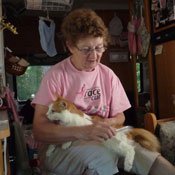It only took Millie Williams a few minutes to decide that the animals needed her. Watching footage of Hurricane Katrina on television at her home in Pennsylvania, Williams saw evacuees from New Orleans leaving their pets behind.
"I saw that those people had to set their dogs back off the bus—they wouldn't let them on the bus," Williams told me a couple weeks ago. "That man put that little white poodle down on the bridge. They had to pick (the man) up and carry him onto the bus. There was just no way. (I) had to come."
Williams set out from Port Allegany, Pa., in late September 2005, towing a 19-foot camper behind her "Mini Winnie" RV. She connected with local chapters of the American Society for the Prevention of Cruelty to Animals and other independent shelters, and began transporting loads of dogs and cats—sometimes 27 at a time—from Louisiana and the Gulf Coast to shelters further north.
After spending several years volunteering with animal rescue organizations along the Gulf Coast, Williams made her way farther north. For the past year, she has mostly lived in her mobile home, parking at Walmarts in the Jackson metro area. She now spends most of her time trapping feral cats, taking them to be spayed or neutered and then releasing them. For Williams, TNR (trap, neuter, release), is just common sense.
"I had a teenage girl in the grocery store tell me ... ‘I think that's terrible! ... Making that decision for those cats. I wouldn't want anybody to make that decision for me.' Well baloney, lady, you're not going to have 420,000 babies eight years down the road," Williams said. "I couldn't believe that girl said that. But that's the attitude. They don't get it. They just don't get it."
Williams also fosters animals. Friends and acquaintances from the network of animal lovers that she has developed since Katrina call her when they have rescued an animal but cannot care for it.
When I visited her in a campground in early July, she had three dogs and at least nine cats in the mobile home. Two cat cages stacked on one top of the other covered the RV's table. Cats mewed from behind a curtained sleeping loft above the cab and dozed on top of seats.
The RV smelled strongly of animals, but it didn't stink. Williams said that she opens the windows in her RV every day, regardless of the weather, and keeps three air purifiers and a fan running nonstop.
Williams will get the animals veterinary care and foster them while they recover. She tries to find families to adopt the animals, but many that she accepts are unadoptable. One cat has had a herpes infection in its eye for months. Another has a respiratory infection and wheezes throughout the two hours of my visit.
Williams has had her fair share of health problems—Lyme disease, two breast-cancer operations—but none caused by the animals, she says. She is also facing a civil action in Pearl Municipal Court for having more than the 14 animals allowed under the city code. She worries that Pearl Animal Control will seize her cats and dogs.
"If it wasn't for these animals, I wouldn't worry whether I was here or not," she says, petting Mista, a black Tonkinese cat. "I mean that sincerely, because I've had enough other stuff to deal with that if I had to go through all the rest of this stuff, I don't know. ... They give people those balls to relieve stress. Well, I don't need one of them. All I need to do is this."



Comments
Use the comment form below to begin a discussion about this content.
comments powered by Disqus